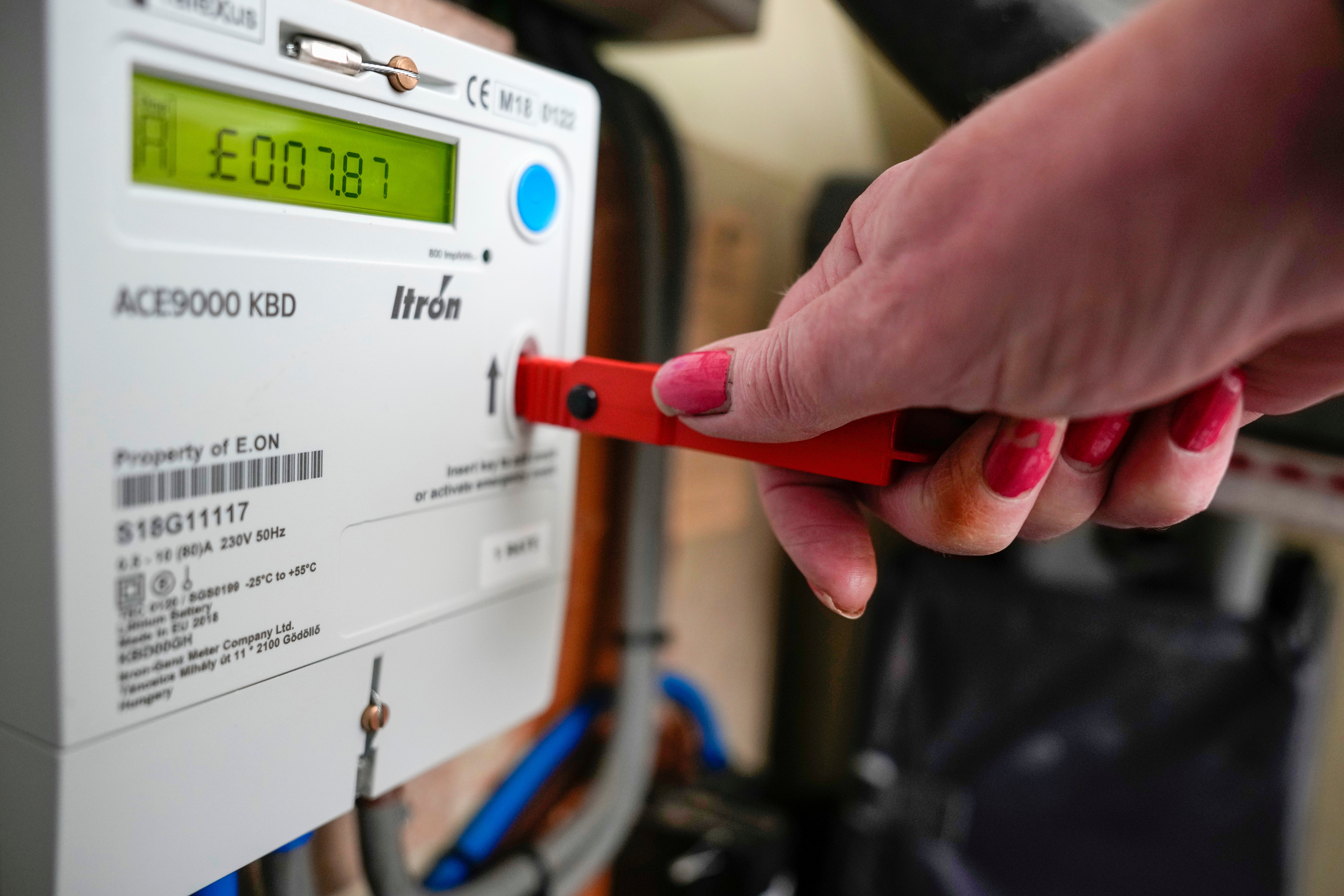This callous government is driving the poor into a nefarious doom-loop of debt
Loan sharks are demanding drugs and sexual favours from desperate victims – yet regulators fail to act, writes Gordon Brown


Your support helps us to tell the story
From reproductive rights to climate change to Big Tech, The Independent is on the ground when the story is developing. Whether it's investigating the financials of Elon Musk's pro-Trump PAC or producing our latest documentary, 'The A Word', which shines a light on the American women fighting for reproductive rights, we know how important it is to parse out the facts from the messaging.
At such a critical moment in US history, we need reporters on the ground. Your donation allows us to keep sending journalists to speak to both sides of the story.
The Independent is trusted by Americans across the entire political spectrum. And unlike many other quality news outlets, we choose not to lock Americans out of our reporting and analysis with paywalls. We believe quality journalism should be available to everyone, paid for by those who can afford it.
Your support makes all the difference.At this time of reshuffles, the Ofgem regulator, Jonathan Brearley, should consider his position for failing on his responsibilities to energy customers subject to the forced installation of pre-payment meters.
The regulator’s official responsibility could not be clearer. His stated role is to “protect energy customers by ensuring they are treated fairly”, an instruction that is especially relevant as oil and gas companies record windfall profits.
If even that duty is not explicit enough, his obligation is set out in print even more pointedly: “Stamping out sharp and bad practice.” So Brearley – and the now restructured Energy Department – should immediately explain why instead of being on the side of the public, they have failed dismally to properly monitor and expose utility companies and their debt agents who, in the middle of the worst cost of living crisis for 50 years, have been breaking into the homes of impoverished customers.
With the court orders used for forced entry now paused at the diktat of a High Court judge, the official agencies guilty of this dereliction of duty should face up to the sheer scale of the damage being done to those least able to afford it.
There are 3.2 million people on pre-payment meters, including 600,000 of them who have been recently switched, many of them by forced entry to their homes. As Ed Miliband has recently said, we need a ban in place on the forced installation of meters until this rotten system is reformed.
And as local charities I work with are finding, users of pre-payment meters have to spend a lot more for each unit of their energy. Even then, at least 20 per cent have not been able to obtain or cash the discount vouchers they were promised, so this failure to act is creating an even more serious social emergency for hardpressed families: pushing them further into debt and, most worrying of all, into the hands of illegal moneylenders.
And Ofgem is not alone in failing to defend low-income families against the indefensible. Right across government and its agencies, harsh and callous policy decisions are turning illegal money lending into Britain’s biggest booming business among low-income communities.
From the Department for Work and Pensions’ (DWP) decision to continue with a succession of punitive measures – the bedroom tax, the two-child rule, the benefit cap and the short-changing of help with rents – ministers are leaving families unable to cover the costs of their weekly food bill, without resorting to borrowing wherever they can find cash. The welfare state safety net is now full of holes – and instead of being the last line of defence for people in need, our own social security ministry is pushing families into ever more desperate measures.
Blood is in the water and loan sharks are circling. A record number of families are now so deep in debt that they are turning to the door-step lender, and the pay-day lender standing outside the cut-price stores, the pub and the betting shop. And even more worryingly, as illegal money lending moves online, the desperate are even more at risk as long as these social media platforms remain exempt from proper scrutiny.
Separate estimates by both the Centre for Social Justice and Vulnerability Registration Service suggest an astonishingly high number of families – 1.08 million and 1.2 million respectively – are already in hawk to loan sharks, four times as many as the most recent official estimate of 310,000.
Indeed, even the 1.2 million figure may itself be an underestimate: the most recent survey in a January BBC poll reported that 5 per cent of the public were now borrowing in this way, suggesting the numbers fallen prey to loan sharks may be as high as 1.4 million households. And the figure could continue to rise. They represent just half the 3 million families in Britain estimated to be unable to heat their homes – and, as the pressures to repay bills intensify particularly after post-Christmas bills pile up, many more are at risk of falling prey to the most ruthless lenders.
The loan shark has always been found lurking in the back alleyways in the poorest communities. But now preying on desperate parents, charging exorbitant interest rates that have been known to go as high as 130,000 per cent, they will intensify the threats on the vulnerable when payments fall behind; creating a downward spiral of debt and despair. If we do not act, this will soon lead to destitution for yet more thousands of impoverished families.
The figures for the overall amount of indebtedness bear out the worsening picture that I have seen first-hand in my local communities. By last summer, low-income households owed a total of £3.5 bn – more than £1,000 per borrower – in high-cost loans. By December, it had risen to £4.6bn, more than 30 per cent higher.
Further detailed research by the Centre for Social Justice shows four in five debtors try to borrow from a regulated lender before resorting to a loan shark, but as Fair by Design shows, low-income families already suffer from punishing terms when it comes to accessing credit in the ordinary marketplace. A sub-prime credit card will cost an estimated £200 more per year than any ordinary card; and personal cash loans cost £500 more.
And so, rejected by the bank or building society, people turn in desperation to loan sharks and then multiples of already usurious interest rate payments keep on rising as families fall behind in rent, telecoms and, of course, heating and fuel bills.
Taking out loans does not however bring families up to date on their standard bills for rent, utilities or ordinary purchases. They will almost certainly also owe money to many creditors – to their housing authority, the DWP and their utility company as well as to the loan sharks. A year ago, it was 33 per cent – or 3.8 million households – behind on such bills. Now the latest figure is 4.6 million and the most recently available figures suggest an average of just over £500 is owed for council tax, £440 for water and £410 for energy bills. At least half of these 4.6 million households are behind on three or more different debts and thus at greatest risk of falling prey to the doorstep or payday lender.
And so, a nefarious doom-loop arises. People take on high-cost credit loans to pay off the last but one bill, and then as the loan shark’s interest rate rises yet again, they fall further into debt and cannot pay off the current bill.
The effects on family life can be devastating. As the report of the Centre for Social Justice says: “We have been alarmed by numerous cases we have seen in which illegal lenders have demanded a borrower support their ‘business’ by delivering drugs or referring new clients to them. In others, sexual favours have been demanded, with one lender even writing the expectation of sexual services into a borrower’s ‘contract’.”
The England Illegal Money Lending Team is actively warning us about the large concentration of cases in Manchester, Lancashire, and Merseyside, but also in the Midlands. Police have warned that thousands of families now face a “cocktail of debt” that could spiral out of control if nothing is done. Now, warnings about the threat of loan sharks have to be stepped up by all agencies concerned about family poverty.
There are better courses to recommend. Close to 1.5 million families people use credit unions and we must make it easier for people to access them.
To avoid families being at the mercy of loan sharks, the DWP has to reset its role from being the biggest debt collection agency in the country. It has to reduce the repayment conditions and harsh timelines imposed on the 2 million benefit claimants now subject to deductions for loans they have had to take out on joining universal credit.
And as the heating and food bills continue to escalate, so the DWP must reduce and, for a time, suspend the deductions from benefits. At the moment they can rise as high as 30 per cent of monthly payments and force claimants into the hands of the loan sharks. The severity of the sanctions regime has to be addressed too. Sanctions can be £11 a day – and when the numbers on sanctions have risen threefold in three years to 115,000, and are set to rise yet again – questions have to be asked.
Court sentences imposed on illegal money lenders should be toughened up, as recommended by the England Illegal Money Lending Team. Amendments should be made to the new Online Safety legislation holding social media platforms responsible for detecting and banning loan sharks from their platforms.
A winter that started with escalating food and fuel bills should not be ending with the criminal exploitation of the misery of millions. Just as it is the government’s duty to ensure the regulators and other public servants serve the public, so it is for the government to ensure that there is no hiding place for these lawbreakers who compound the misery faced by desolate families.
Gordon Brown is the former prime minister and chancellor of the UK
*Footnote: this article was amended on February 8 2023. It previously inaccurately said that 3.2 million people’s meters had been disconnected ‘by the back door’, but this figure represents the total number of people on prepayment meters.
Join our commenting forum
Join thought-provoking conversations, follow other Independent readers and see their replies
Comments